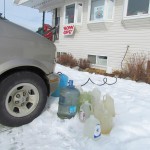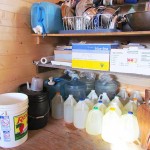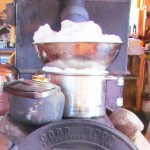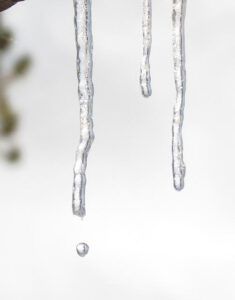The Cry of the Kalahari
Some years ago, I read the Cry of the Kalahari by Mark and Delia Owens. It is about a young American couple who lived for 7 years in the Kalahari desert, studying animals. Brief annual rains would bring water nearer, but most of the time they lived 100 miles from the nearest supply. They rationed themselves to 3 gallons a day – between them, including their vehicle. At my ecotourism resort in the mountains I haul water from the lake. I have an infinite supply, but because I am lazy, I generally try and keep to one medium-sized bucket – also around 3 gallons. This is for me alone. This includes dishwashing but not laundry, which I take down to the water’s edge to rinse. For comparison: older toilets used almost that amount for a single flush! Low-flow toilets use a little under half. How that couple, often living in great heat and dryness, managed to exist on so little, is amazing; especially as they had very little fresh food, for nothing could be grown there.
My house is unfinished inside. It is warm and weatherproof, but basically I am camping in it, using plywood shelves and storing possessions  in cardboard boxes. Eventually, I hope to be able to drill a well and have plumbing. (Not a water-cleaned toilet, though: I am going to use a compost toilet.) For now, I haul water from the Nimpo Lake Post Office every time I go for mail, which is usually about twice a mont
in cardboard boxes. Eventually, I hope to be able to drill a well and have plumbing. (Not a water-cleaned toilet, though: I am going to use a compost toilet.) For now, I haul water from the Nimpo Lake Post Office every time I go for mail, which is usually about twice a mont h. And yes, that is all I needed to replace after 16 days’ use.
h. And yes, that is all I needed to replace after 16 days’ use.
Here is what 3 – 4 weeks’ cooking and drinking water looks like in my house.
I am using so little at the moment because for bathing and dishes I melt snow. Every day I fill a big pot and bowl and leave it on the stove. One advantage of all these thaws (which are still happening) is that the snow I shovel is very dense. When it melts, it will last 2 days. The disadvantage is that it is loaded with pine needles and debris because of the high winds that have come with the thaws.
all these thaws (which are still happening) is that the snow I shovel is very dense. When it melts, it will last 2 days. The disadvantage is that it is loaded with pine needles and debris because of the high winds that have come with the thaws.

